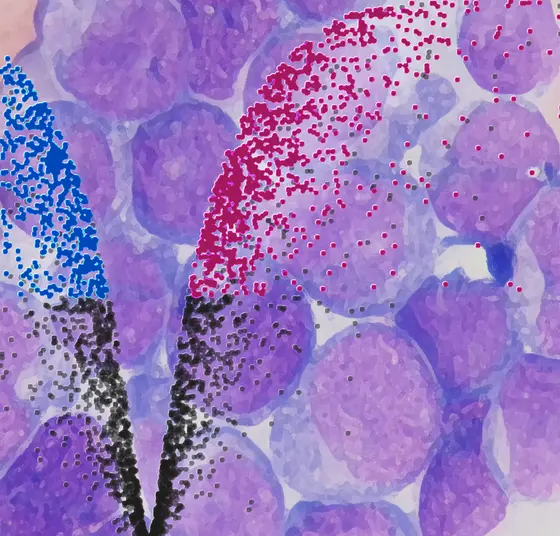Acute myeloid leukemia (AML) is an aggressive type of blood cancer that very often relapses in the wake of successful initial treatment. Stem cells that are resistant to therapy are held responsible for this. Scientists working with Andreas Trumpp from the German Cancer Research Center (Deutsches Krebsforschungszentrum, DKFZ) and HI-STEM* wanted to understand the molecular background to this resistance. To this end, they examined patient samples by comparing the composition of proteins of AML stem cells and leukemia cells without stem cells properties.
The investigators found suspiciously high levels of an enzyme called BCAT1 in the stem cells. These levels rose even higher during a cancer recurrence. The researchers considered this to be a clue that BCAT1 might be linked to therapy resistance.
Cancer researchers have suspected for some time that the BCAT1 enzyme, which is responsible for the breakdown of specific proteins in food, plays a role in the development of malignant tumors. A team led by Bernhard Radlwimmer from DKFZ had recently found that an overproduction of BCAT1 increases the aggressiveness of malignant brain tumors and breast cancer.
The two research groups have now joined forces in order to find out how BCAT1 influences the therapy resistance of leukemia stem cells. They discovered a previously unknown process in which a key molecule of energy metabolism plays a crucial role. BCAT1 reduces the levels of this key molecule and this leads to increased levels of chemical labels in the DNA.
“These tiny methyl groups that are attached to DNA determine whether particular genes are active or silent and, thus, have an immense impact on all cellular functions,“ said Simon Raffel, one of the study's first authors.
This result made the two DKFZ teams pay close attention, because in another 30 percent of AML cases, defects in other enzymes lead to the same consequence: They increase cancer-promoting methylation of DNA. AML is known for an extremely heterogeneous pattern of genetic alterations. However, misregulated methylation with its drastic consequences for the whole cell appears to be a common characteristic of this malignant disease.
The finding that BCAT1 drives cancer-promoting methylation in AML stem cells and other cancer stem cells opens up new options for therapy: “A blockade of the enzyme using a targeted agent might normalize DNA methylation and thereby reduce cancer spread and therapy resistance,“ Trumpp said.
* The Heidelberg Institute for Stem Cell Technology and Experimental Medicine (HI-STEM) is a partnership between the DKFZ and the Dietmar Hopp Foundation.
Simon Raffel, Mattia Falcone, Niclas Kneisel, Jenny Hansson, Wei Wang, Christoph Lutz, Lars Bullinger, Gernot Poschet, Yannic Nonnenmacher, Andrea Barnert, Carsten Bahr, Petra Zeisberger, Adriana Przybylla, Markus Sohn, Martje Tönjes, Ayelet Erez, Lital Adler, Patrizia Jensen, Claudia Scholl, Stefan Fröhling, Sibylle Cocciardi, Patrick Wuchter, Christian Thiede, Anne Flörcken, Jörg Westermann, Gerhard Ehninger, Peter Lichter, Karsten Hiller, Rüdiger Hell, Carl Herrmann, Anthony D. Ho, Jeroen Krijgsveld, Bernhard Radlwimmer, and Andreas Trumpp: BCAT1 restricts αKG levels in AML stem cells leading to IDHmut-like DNA hypermethylation
Nature 2017, DOI: 10.1038/nature24294
A picture for this press release is available at:
Trumpp_Radlwimmer_nature.jpg
Picture Caption: Blood cancer is initiated by leukemic stem cells characterized by a specific protein expression pattern.
Note on use of images related to press releases
Use is free of charge. The German Cancer Research Center (Deutsches Krebsforschungszentrum, DKFZ) permits one-time use in the context of reporting about the topic covered in the press release. Images have to be cited as follows: “Source: Simon Raffel, DKFZ“.
Distribution of images to third parties is not permitted unless prior consent has been obtained from DKFZ's Press Office (phone: ++49-(0)6221 42 2854, E-mail: presse@dkfz.de). Any commercial use is prohibited.



